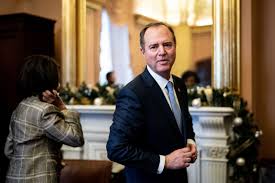When Politics, Secrecy, and Whistleblowers Collide: The Adam Schiff Controversy
What unfolds when politics, secrecy, and whistleblowers intersect at the highest levels of Washington? Senator Adam Schiff—a figure long entwined in debates over national security and congressional oversight—now faces fresh scrutiny.
Leaked FBI documents and testimony from a whistleblower claim that classified information may have been manipulated, blurring the lines between public service and political maneuvering. But where does genuine concern end and calculated narrative begin?
The answers remain unclear, yet the stakes could reshape American trust in the institutions meant to protect them.
From Oversight to Allegations
As chair of the House Intelligence Committee, Adam Schiff was at the center of some of the most divisive moments in recent political history—questions of election interference, foreign influence, and sensitive intelligence dominated headlines and congressional hearings alike.
Amid this charged atmosphere, allegations surfaced suggesting intelligence was selectively presented to fit political agendas. In 2024, an intelligence staffer-turned-whistleblower reignited the debate, accusing the committee of skewing data and retaliating against those who raised ethical concerns.

The Whistleblower’s Claims
The whistleblower paints a picture of a politically charged environment where intelligence was tailored to support particular narratives rather than objective truth. He alleges facing professional backlash—reassignment and exclusion from briefings—after voicing concerns internally.
Though these claims remain unverified and represent a single perspective, they highlight Washington’s enduring struggle: safeguarding whistleblowers while ensuring fair and thorough evaluation of their accusations.
Legal and Ethical Complexities
Handling classified information is governed by strict laws, with unauthorized disclosure carrying serious consequences. Yet proving misconduct is complicated, often hinging on intent and context.
Distinguishing legitimate congressional oversight from improper leaks remains a murky area. To date, no Department of Justice investigations or charges have been confirmed, leaving the public in a swirl of speculation.
Media, Transparency, and Public Perception
Schiff’s extensive media engagements during his tenure have sparked debate. Advocates argue transparency is vital for democracy; critics warn of potential misuse of sensitive intelligence for political ends.
This controversy underscores the delicate balance officials must maintain: informing the public without compromising national security in an era of instant news and viral stories.
Political Fallout
Republicans have demanded formal probes, citing accountability concerns, while Democrats urge caution against inflaming unsubstantiated allegations that could erode trust.
Both sides reflect the deeper partisan divide shaping American views on justice and institutional integrity.
The Bigger Picture: Trust in Institutions
At its heart, this controversy challenges faith in U.S. institutions. Years of scandals, polarization, and perceived unequal law enforcement have sown public distrust. When high-profile figures face such allegations, skepticism intensifies, regardless of proof.
Historical Echoes
This saga echoes past moments of national reckoning—Pentagon Papers, Watergate, Snowden leaks—each forcing the country to weigh transparency against security and confronting the fallout from mishandled information.
Governance Lessons
Transparency builds trust: Open investigations strengthen democracy.
Equal enforcement matters: Laws apply to everyone, regardless of rank.
Whistleblower protections are essential: Safeguarding ethical reporting is vital.
Responsible media coverage is crucial: Accurate reporting supports informed discourse.
Updated oversight protocols: Clear guidelines for sensitive information can prevent future crises.
Schiff’s Response
Adam Schiff denies any wrongdoing, calling the allegations partisan attacks. His supporters insist these claims recycle old political battles, and demand full release of FBI documents to set the record straight.
What’s Next?
Beyond politics, this controversy exposes systemic challenges: deep divisions, competing narratives, and a public struggling to trust institutions. How Washington manages secrecy, oversight, and whistleblower protections will shape democratic resilience for years to come.
Conclusion
The Adam Schiff whistleblower saga tests America’s commitment to transparency, accountability, and the rule of law. While the claims remain unverified, they highlight the fragile balance between secrecy and oversight, protection and politicization. This isn’t just about one senator—it’s about the very foundation of democratic trust. How the nation navigates these tensions will define not only Schiff’s legacy but the credibility of its most critical institutions.
